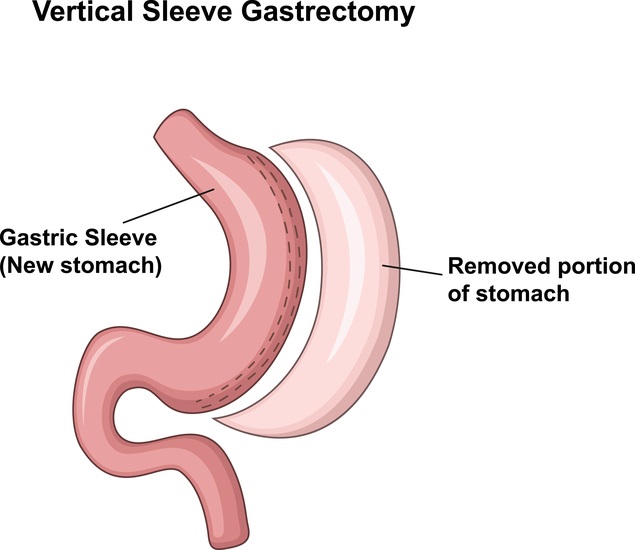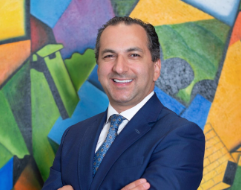
Maybe you’ve consulted with your doctor and decided together that gastric sleeve surgery is the best option for you. Or, perhaps you’re doing research before you make your decision. Either way, knowing what to expect after gastric sleeve surgery will help you have the best possible outcome.
Understanding the gastric sleeve procedure
To understand more about your recovery, it will help to understand more about exactly what happens during the surgery.
In general, the stomach’s capacity is about one liter, though it can stretch to accommodate more — even up to four liters, which is more than a gallon. People who eat past the point of feeling full experience this.
In gastric sleeve surgery, about 80 percent — more than two thirds — of your stomach is simply removed. What remains is a tubular section that resembles a banana, the “sleeve,” which connects your esophagus to your small intestines. (The name may be confusing; some people believe that a sort of “sleeve” is used to compress the stomach. That’s not the case. The name simply reflects the appearance of the stomach after the surgery.) The remaining part of the stomach is sealed closed with staples or stitches.
The procedure is done laparoscopically, meaning that your abdomen is inflated with gas after you are anesthetized and the surgery is done through small incisions. Because of this, your hospital stay most likely will be short; two to three days is typical.
How does gastric sleeve surgery work?
Since your stomach is significantly smaller after the procedure, the amount of food you can eat is vastly reduced. This alone would result in substantial weight loss, but removing part of your stomach also affects the level of your gut hormones, which help control your blood sugar and your feelings of hunger and satiety. You will not feel as hungry, and you will feel full sooner.
Due to these combined effects, it is likely that you will lose up to about 70 percent of your excess weight within a year. Expect to lose:
- By the end of three months: About 33 percent of your excess weight
- By the end of six months: About 50 percent of your excess weight.
- By the end of a year: About 70 percent of your excess weight.
In addition to the weight loss, several other health conditions will likely improve or go away entirely including diabetes, sleep apnea, high blood pressure, asthma and cholesterol issues.

What to expect after surgery
Even though it is a laparoscopic procedure, don’t lose sight of the fact that gastric sleeve surgery is major surgery. Recovery can be painful at first, and you will tire easily. Knowing what to expect goes a long way toward alleviating uncertainty. Here are some answers to frequently asked questions:
- How long will I be in the hospital? The average is two to three days.
- How long does full recovery take? From four to six weeks. Most people feel significantly better after the first two weeks.
- When can I return to work? Two weeks is common, and you may want to return part time at first.
- How much pain will I be in? When you first wake up from surgery, your pain and any nausea will be managed with IV medication. In the first 24 hours, you may have pain around your incisions. The pain reduces each day post-surgery; pain management will slowly be shifted from IV medicine to self-administered pain medication to pain pills.
- What do I eat after the surgery? You won’t eat or drink anything during the first 24 hours post-op. On day two, after a “leak test” to be sure your stomach staples aren’t leaking, you can begin a diet of clear liquids, which will last for a few days. You will transition slowly to thicker liquids, such as smoothies, over the next few days. In about 2 weeks, depending on your progress, you will slowly transition to soft and pureed foods. And 3 weeks in, again depending on your progress and your surgeon, you can begin eating some solid foods. Four to six weeks in, you can begin your long-term maintenance diet. For more information, read our Post-Op Diet Guide.
- Can I exercise afterward? This, too, will be a slow transition as your body heals. Hospital staff will encourage you to walk around several times a day beginning the day after surgery. You will be given walking, leg and breathing exercises, and will increase them according to your surgeon’s advice. Light physical activity can begin about five days post-op; for the first three weeks, you shouldn’t lift more than 10 pounds. You should be back to your regular level of activity within four to six weeks.
- How long until I can drive again? Typically, about a week, unless you are on prescription pain medications that would interfere.
Gastric sleeve surgery isn’t easy, but neither is being morbidly obese. If you are taking this step forward for your health, ask your surgeon for his or her expectations, and plan ahead for your recovery. The positive effects of your surgery can last a lifetime.

